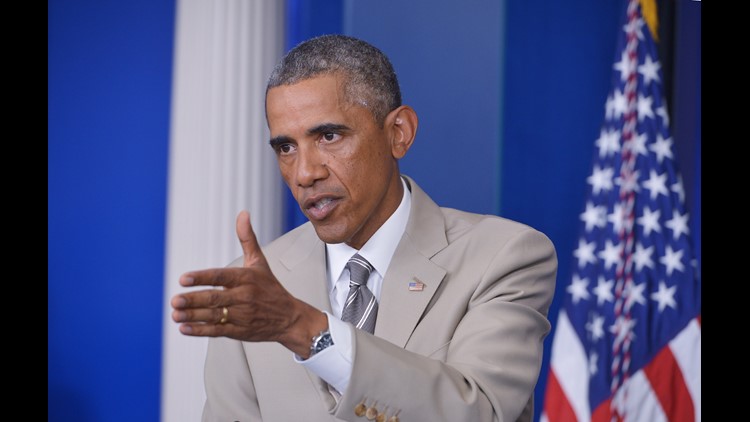WASHINGTON — President Obama said Wednesday he is prepared to order airstrikes on Syrian territory as part of an expanded counter-terrorism plan to confront the Islamic State jihadist group that is operating in both Syria and Iraq.
Obama, who began ordering airstrikes in Iraq last month, also told a national television audience he is urging Congress to approve money for training rebel forces in Syria.
"I will not hesitate to take action against ISIL in Syria, as well as Iraq," Obama said while discussing plans for expanded airstrikes.
FULL TEXT | President Obama's speech to the nation
The president's counter-terrorism strategy also includes: more airstrikes in Iraq; the deployment of 475 more U.S. military troops to assist the Iraq military, bringing the total number of American advisers to some 1,600; help from other countries; and an emphasis on having local ground forces battle the insurgent group that is also known as ISIL or ISIS.
"America will lead a broad coalition to roll back this terrorist threat," Obama said.
![Local experts react to Obama speech[ID=15429949] ID=15429949](http://bcdownload.gannett.edgesuite.net/wxia/34310441001/201409/2566/34310441001_3778878393001_Still0910-00013.jpg?pubId=34310441001)
The president did not specify when and how the U.S. might strike at Islamic State targets in Syria. Asked about a timetable for a strikes in Syria, one senior administration official said that "we're not going to telegraph our punches."
![Mass Relevance [ID=15420163]](/Portals/_default/Skins/PrestoLegacy/CommonCss/images/embed.jpg)
Do you agree with President Obama's strategy to defeat ISIS? Vote in the poll above. If you don't see the poll, tweet us using #agree11 or #disagree11. Note: You must be logged in to Facebook or Twitter to vote.
CONGRESSIONAL LEADERS REACT
Congressional lawmakers expressed support for the idea of defeating the Islamic State but want more details on the president's plan.
House Speaker John Boehner, R-Ohio, a frequent Obama critic, said he supports the idea of training Iraqi and Syrian fighters, but "I remain concerned that those measures could take years to fully implement at a time when ISIL's momentum and territorial gains need to be immediately halted and reversed."
Boehner said that while Obama presented "a compelling case for action, many questions remain about the way in which the president intends to act."
Human rights groups questioned what some called an over-reliance on military options.
Amnesty International called on Obama to make a commitment that U.S. strikes "be directed at bona fide military targets ... Amidst the horrors caused by Islamic State, U.S. policymakers should pause and ensure that US policies do not do further harm to civilians caught in the ongoing conflict," the group said.
Obama and aides said the Islamic State is not an imminent threat to the United States but could be in the future if not checked now. Two White House aides spoke on condition of anonymity because they were not authorized to speak publicly about potential plans.
Again pledging not to deploy American combat troops, Obama said that his new "counter-terrorism campaign" against the Islamic State is based on ongoing operations in Yemen and Somalia. He described it as "a steady, relentless effort to take out ISIL wherever they exist using our air power and our support for partner forces on the ground."
In addition, Obama authorized $25 million in existing money for additional military assistance and training to Iraq, including the Kurdish regional government. And the Treasury Department announced new plans to try and disrupt Islamic State financing.
Obama also warned Americans that his plan carries "risks" and "it will take time to eradicate a cancer" like the Islamic State. Indeed, it could last beyond Obama's presidency, which ends in January 2017.
Training and equipping the Syrian rebels — who are fighting Bashar al-Assad's government, as well as the Islamic State — requires congressional approval and funding.
The administration is lobbying lawmakers — including phone calls from Obama and Vice President Biden — to approve funding for the program as part of an overall spending plan this month, said two administration officials speaking on condition of anonymity because they were not authorized to speak publicly on the issue.
Obama aides said they believe he has existing authority to order airstrikes in Syria.
Last year, when Obama considered strikes against Assad's government over its use of chemical weapons, the president did plan to seek congressional authorization. Obama called off strikes when Syria agreed to turn over chemical weapons. Those weapons have been destroyed.
In recent weeks, U.S. aircraft are conducting surveillance flights over potential targets in Syria.
The president authorized airstrikes against Islamic State positions in Iraq on Aug. 7; the strikes began the next day.
In the run-up to the address, Obama dispatched Secretary of State John Kerry to Baghdad to speak with the leaders of Iraq's newly formed government. The administration is counting on that new government to help train Iraqi security forces to fight the Islamic State.
Kerry -- who will travel throughout the Middle East and Europe in the coming days -- said the Iraq army will be "reconstituted and trained" to meet the threat of the Islamic State.
Kerry also announced $48 million in humanitarian aid for Iraq, including nearly $11 million to assist Iraqi refugees who have fled to Jordan, Lebanon, and Syria.
Obama has been talking with foreign leaders about his Islamic State plan, speaking by phone Wednesday with Saudi Arabia's King Abdullah.
In a readout of that call, the White House said King Abdullah expressed support for a program to train and equip "the moderate Syrian opposition." The U.S. and Saudi leaders agreed that "a stronger Syrian opposition is essential to confronting extremists like ISIL as well as the Assad regime, which has lost all legitimacy," the White House said.
Islamic State militants have seized control of parts of Syria and Iraq, and U.S. officials say they may use a declared "caliphate" to launch attacks on the United States and allies.
The jihadist group has issued threats against the United States, including videos that show the beheadings of two American journalists. The horrific murders galvanized the administration to step up efforts against the Islamic State, plans that enjoy support from the American public according to new polls. Two U.S. citizens have been reported killed in Syria while fighting with the terror group.
Obama outlined his Islamic State strategy Tuesday in a meeting with congressional leaders.
LOCAL EXPERTS REACT
Todd Stein, a terrorism expert out of Georgia Tech, and Shawn Ramirez, an expert on international relations from Emory University, shared their thoughts on the speech with 11Alive.
"I think we need to worry about the threat of non-state actors posing a threat globally to all countries around the world," Ramirez said. "If this is going to be a problem -- not just with Al Qaeda, not just with ISIS -- should we allow non-state actors to run rampant in countries that neighbor us?"
"ISIL is really Al Qaeda version 6.0, as I heard one counter terrorism official say recently," Stein said. "It's the same enemy. It's the same ideology and it's the same tactic -- just more brutal and their media campaign is a lot better. So in a sense, if we look at the arc of things, since 9/11…things have gotten a lot worse."
![Todd Stein discusses president's ISIS plan[ID=15434605] ID=15434605](http://bcdownload.gannett.edgesuite.net/wxia/34310441001/201409/586/34310441001_3779420987001_ISIS.jpg?pubId=34310441001)
The president touched on America's role as the world's beacon of hope, but if country is war weary, many will question whether we have the appetite and will to see this through. If not, instability could spread like a chain reaction of chaos, experts said.
"America's role is really indispensible and that was something the President alluded to in the speech," Stein said. "There is no other country that can do what we are in a position to do. Once again, left unchecked, this problem becomes much worse for the entire world and then becomes much worse for us."
"That credibility for the United States is on the line in a lot of ways and it's been on the line since the red line was drawn in Syria," Ramirez said. "It's not clear necessarily who our enemies are and who our friends are and I think a lot of countries are looking to figure that out."
The experts agreed that winning the hearts and minds of the enemy will be tough. There are Americans learning jihad on the front-lines in the Middle East right now.
![CentriNews[ID=14984961] ID=14984961](/Portals/_default/Skins/PrestoLegacy/CommonCss/images/embed.jpg)



